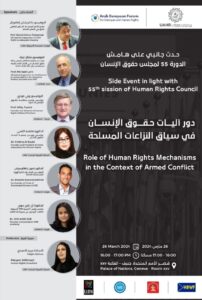The role of NGOs to protect civilians in armed conflicts
Paper presented at a side-event at the UN in Geneva on 26 March
By Willy Fautré, director of Human Rights Without Frontiers
HRWF (29.03.2024) – Armed conflicts are very often triggered despite prevention efforts deployed over years and decades by domestic and foreign political powers as well as by local and international non-governmental organizations.
These conflicts cause victims among combatants but also among civilians, as shown by the ongoing wars in Ukraine and the Middle East.
In the case of Russia, as a potential threat to the security and the sovereignty of its neighboring countries, our organization, Human Rights Without Frontiers, has contributed for decades to the development of human rights NGOs and activists in the country. We have raised our voice every time restrictions of their activities and repressive measures have been taken by the Russian government to silence journalists and critical voices of civil society.
On the one hand, prevention of repeated conflicts can be effective and consolidate reconciliation and peace between historical enemies. This was the case between Germany and France with the construction of a security architecture rooted in the creation of the European Union after World War II. On the other hand, prevention is sometimes only effective for a limited period of time because a state or a non-state actor has decided to breach the international code of conduct that had been adopted, monitored and enforced by the United Nations.
The protection of civilians during wars is a major priority because they are not involved as direct actors in armed conflicts but we notice that they are more and more used as human shields, instrumentalized by warring parties and targeted on purpose by shelling to destroy the morale of the population and their political leaders.
Killing civilians is a war crime. Taking civilians as hostages is a war crime. Deporting thousands of children from the Ukrainian occupied territories to Russia is a war crime.
It is the duty of human rights organizations to monitor, document, make public war crimes, to denounce them through the various mechanisms of the United Nations and other international institutions. Such advocacy is meant to dissuade the warring parties from persisting in egregious violations of human rights but also to have an anticipation role: to avoid more civilian victims.
It is the duty of NGOs to defend the legal and moral standards meant to rule the relations between states and peoples. In the case of the deportation of 20,000 Ukrainian children to and by Russia, we have documented the issue and sent our report to the International Criminal Court. We have made it public through written and oral statements at the UN Human Rights Council but also at the last meeting of the UN Human Rights Committee on Child’s Rights which had Russia on its agenda. We have also identified a state in the Middle East which had mediated between Russia and Ukraine and had successfully managed to get from Russia the repatriation of a dozen Ukrainian children and several family reunifications. These are initiatives that NGOs are expected to take.
Furthermore, NGOs play a pivotal role in providing humanitarian assistance and support to conflict-affected populations. From delivering food aid and medical supplies to offering psychosocial support and legal assistance, they address the immediate needs of civilians caught in the turmoil of war. By operating impartially and independently, they strive to alleviate human suffering, uphold the principles of neutrality and impartiality, and safeguard the dignity and rights of all individuals, regardless of their affiliations or backgrounds.
In doing so, they bridge the gap between grassroots activism and global governance, driving systemic change and fostering environments conducive to peacebuilding.
Contributing to peace is a long-term and complex issue. A ceasefire is not peace. A frozen conflict is not peace.
Peace processes are first of all the result of political decisions by the warring parties: the aggressors and the aggressed. External pressure by international institutions such as the United Nations and by the heads of other states can lead to a truce or a temporary ceasefire to open a space for discussion and negotiations but this is only a first small and modest step in a solid peacebuilding process.
It is the duty of domestic and international human rights organizations to engage in conflict resolution and peacebuilding initiatives, working alongside local communities, civil society actors, and peace mediators to mitigate tensions. It is their duty to foster dialogue and build sustainable peace but it can take a lot of time, years and even decades. By facilitating reconciliation processes, promoting interethnic dialogue, and supporting grassroots initiatives for conflict transformation, NGOs contribute to the long-term stability and social cohesion of war-torn societies.
In essence, the role of non-profit human rights organizations in promoting peace and protecting civilians in armed conflicts is not be overstated. They serve as moral guardians of human dignity, advocates for justice, and catalysts for positive change in some of the world’s most challenging environments. However, their efforts are not without obstacles, as they often operate in hostile or restrictive contexts, facing threats to their safety, limited resources, and political obstacles.
Nonetheless, their unwavering commitment to the principles of human rights and peace remains a beacon of hope in the midst of darkness, inspiring collective action and solidarity in the pursuit of a more just and peaceful world.
But it cannot be forgotten that there is no lasting peace without justice and there can be no justice without lasting peace.
Photo: Oleh Syniehubov, Head of the Kharkiv Regional Military Administration

